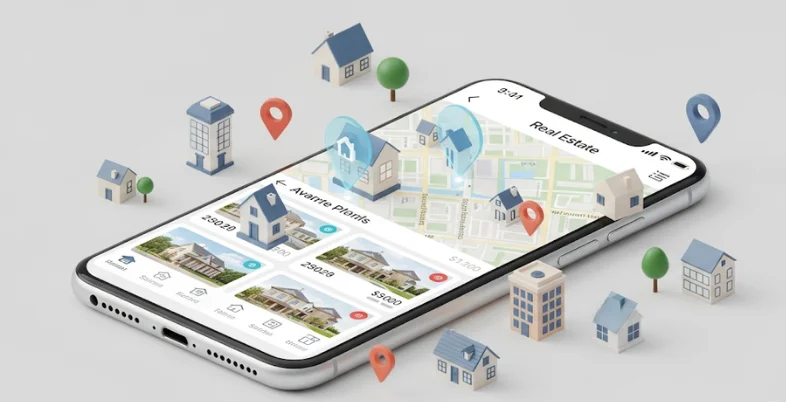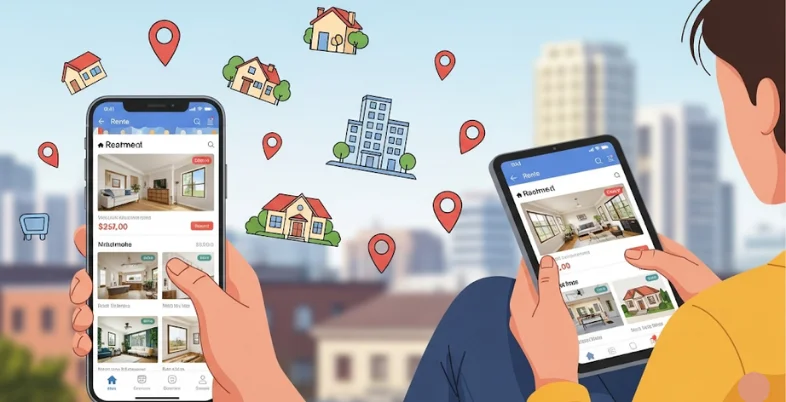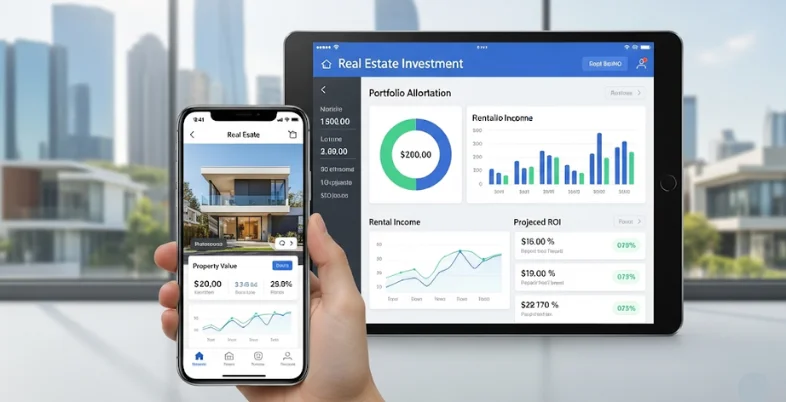The real estate industry has changed dramatically in the last decade, and mobile technology is one of the driving forces behind that transformation. Home buyers can now explore properties from their couch, sellers can monitor their listings in real time, and investors can analyze rental returns without hiring a research team. Real estate apps have become indispensable tools, combining convenience with data-driven insights to make the buying, selling, and investing process faster and more efficient.
This guide explores the key features of real estate apps, highlights the best platforms on the market, and explains how different audiences can benefit from them.
Why Real Estate Apps Matter
The process of finding or selling a home once involved hours of driving through neighborhoods, phone calls with multiple agents, and manually comparing listings. Today, real estate apps have streamlined nearly every step.
They allow buyers to filter properties by specific preferences, sellers to reach millions of active users, and investors to make informed decisions with robust analytics.
For buyers, these apps reduce guesswork by providing instant access to pricing, virtual tours, and mortgage calculators.
For sellers, apps extend reach with built-in marketing tools, exposure on national platforms, and lead management features.
For investors, apps simplify analysis with cash-flow projections, neighborhood rental estimates, and appreciation data.
Features That Make Real Estate Apps Valuable
Most leading apps include a core set of features that benefit all audiences, though some specialize in different areas. These include:
- Comprehensive Listings: Access to homes, condos, rentals, and even land listings tied to MLS databases.
- Advanced Search Filters: Narrow results by square footage, price, school district, or neighborhood.
- Virtual Tours: Interactive 3D walkthroughs and video tours that allow remote exploration.
- Financial Tools: Mortgage and affordability calculators, rent vs. buy comparisons, and pre-approval options.
- Neighborhood Insights: Crime maps, school ratings, walkability scores, and resident reviews.
- Alerts and Notifications: Real-time updates when a new property hits the market.
- Agent Communication: In-app messaging and scheduling to connect directly with agents.
- Investment Calculators: ROI, cap rate, and rental income projections for investors.
These features transform real estate apps from simple listing directories into all-in-one solutions for every type of user.
List of Best Real Estate Apps for Buyers

1. Zillow
Best for: General home buyers and sellers
Highlights: Millions of listings, “Zestimate” home value tool, 3D tours, mortgage calculators. Zillow is often the first app buyers download because of its reach and easy interface. Its Zestimate tool provides an instant estimate of property values, helping buyers evaluate homes quickly.
2. Realtor.com
Best for: The most accurate and up-to-date listings
Highlights: MLS-sourced data, price history, neighborhood stats, school ratings. Realtor.com updates faster than most competitors, often within minutes of MLS entries, making it a go-to for serious buyers.
3. Redfin
Best for: Buyers who want lower commission fees and direct access to Redfin agents
Highlights: In-app tour scheduling, competitive commission refunds in select markets, walkability scores. Redfin’s integration with its brokerage model sets it apart, allowing buyers to book tours and manage the process seamlessly.
4. Trulia
Best for: Neighborhood and lifestyle insights
Highlights: Crime maps, resident reviews, local amenity data, lifestyle overlays. Trulia appeals to buyers who value lifestyle factors as much as the home itself.
5. Homesnap
Best for: Instant property information
Highlights: AI-powered property search by snapping a photo of a home, real-time MLS data, and collaboration tools with agents. Homesnap is popular for its unique photo search capability, making it easy to identify homes while exploring neighborhoods.
List of Best Real Estate Apps for Sellers

1. Zillow Premier Agent
Designed for real estate professionals, this extension of Zillow gives sellers better exposure through partnered agents. Listings gain more visibility, and sellers can connect directly with motivated buyers.
2. Realtor.com Seller’s Marketplace
This tool allows sellers to compare options like listing traditionally, selling to an iBuyer, or requesting a cash offer. It provides flexibility for homeowners who want to weigh convenience against maximum market value.
3. Redfin Listing Tools
Redfin’s platform is attractive to sellers because of its lower listing fees in certain markets, robust marketing, and large buyer audience. Sellers gain analytics about showings, buyer interest, and price competitiveness.
List of Best Real Estate Apps for Renters

1. Apartments.com
Highlights: Extensive rental database, 3D tours, online applications, rent affordability tools. Apartments.com is one of the most comprehensive rental search apps in the U.S.
2. HotPads
Highlights: Map-based rental searches, neighborhood filters, roommate matching. HotPads is especially popular in urban areas where renters value lifestyle and convenience.
3. Zumper
Highlights: Verified rental listings, instant alerts for new apartments, built-in credit checks. Zumper makes the rental process easier by integrating application and screening tools.
List of Best Real Estate Apps for Investors

1. BiggerPockets
Best for: Education and networking
Highlights: Investor forums, ROI calculators, rental property analysis tools, podcasts, and guides. BiggerPockets is more than an app—it is a community for investors to learn, share, and collaborate.
2. DealCheck
Best for: Property analysis
Highlights: Import property data, analyze rental potential, calculate cash flow and ROI. DealCheck is popular among investors for its detailed financial modeling.
3. Roofstock
Best for: Buying turnkey rental properties
Highlights: Marketplace for tenant-occupied rentals, cash-flow analysis, vetted property inspections. Roofstock simplifies investing by offering properties that already generate income.
4. Stessa
Best for: Portfolio management
Highlights: Track rental income, automate expense tracking, create financial reports. Stessa is designed for landlords and small portfolio investors to manage finances efficiently.
Specialty Real Estate Apps

1. Houzz
Best for home design and renovation ideas, Houzz connects homeowners with designers, contractors, and remodeling tools. It’s not strictly a real estate app but often used during buying and selling stages.
2. Dwellr
Created by the U.S. Census Bureau, Dwellr provides demographic data, commute times, and lifestyle insights, helping buyers choose neighborhoods that fit their preferences.
3. Xome
Xome specializes in real estate auctions, offering foreclosures, bank-owned properties, and short sales. It appeals to bargain hunters and investors looking for off-market deals.
How Real Estate Apps Compare
While most apps share core features, the differences lie in accuracy, specialization, and audience focus.
Zillow dominates with its massive reach and user-friendly design, but Realtor.com wins on listing accuracy.
Redfin provides the advantage of lower commissions and integrated agent services.
Trulia excels with lifestyle and neighborhood details.
BiggerPockets and DealCheck target investors, while Apartments.com and Zumper focus on renters.
No single app does everything perfectly, which is why many buyers, sellers, and investors use multiple platforms.
Benefits and Limitations of Real Estate Apps
Benefits: They save time, provide instant data, expand market reach, and support decision-making. Buyers can compare properties side by side, sellers gain national exposure, and investors use tools that simplify complex analysis.
Limitations: Estimates like Zillow’s Zestimate are not always accurate. Not all markets are equally covered, especially rural areas. Apps cannot replace in-person inspections or professional guidance. Privacy concerns also arise with data collection.
The Future of Real Estate Apps
The next generation of apps will likely include deeper AI integration, enhanced predictive analytics, blockchain-powered transactions, and even more immersive augmented reality tours.
These advances will push the real estate industry further into a mobile-first era where data-driven decisions are the norm.
Final Thoughts
Real estate apps have reshaped the way people buy, sell, rent, and invest in property. With tools ranging from virtual tours and advanced search filters to cash-flow calculators and investor communities, they make the process more transparent and accessible.
Zillow and Realtor.com remain the leaders for everyday buyers and sellers, Redfin appeals to those seeking savings and efficiency, Trulia shines with lifestyle data, and BiggerPockets provides unmatched investor resources.
Renters have strong platforms in Apartments.com, HotPads, and Zumper, while specialty apps like Roofstock, Stessa, and Houzz fill unique needs. No matter your goal, there is an app tailored to your real estate journey.

